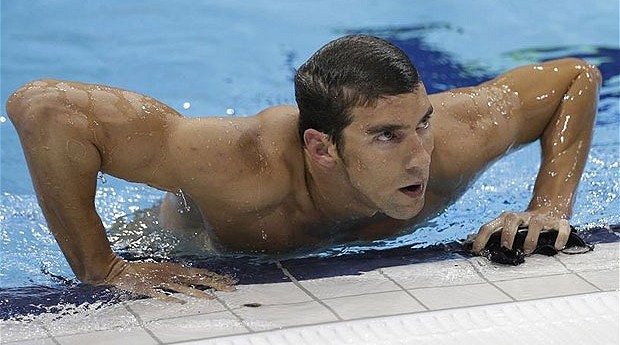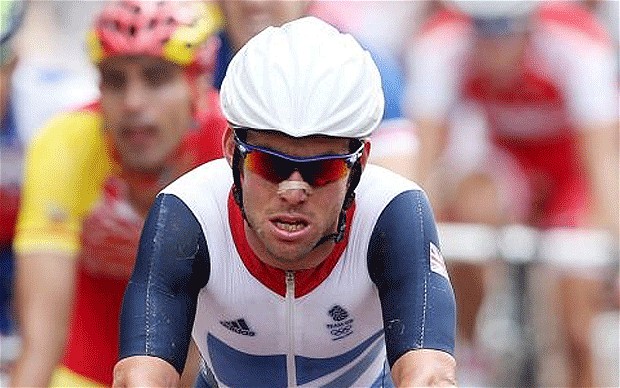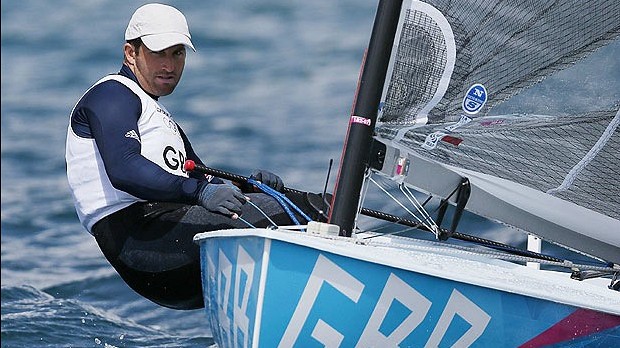Ryan Lochte new king of water as Michael Phelps misses out on medal in 400m medley
After the Beijing Games, Michael Phelps vowed never again to compete in the 400m individual medley. At some point, however, he changed his mind, though he has never explained why, saying: “I’ll give you the honest answer when I’m done.”
He must be wishing now he had stuck to his first instinct. As he took to the blocks for the first of what was supposed to be his London victory tour, just the seven finals to Beijing’s eight, he flapped those albatross arms across his body three times, just as he did before each of the superhuman victories of the last Games.
But there the familiar scenes ended. Lined up in the first of two hotly billed head-to-heads against his USA team-mate Ryan Lochte, the greatest swimmer of all time – with 14 gold and two bronze medals to his name and needing just three more to become the greatest Olympian of all time – came fourth. Whatever occurs in the six more events in which he plans to compete in these Games, the once seemingly superhuman athlete is invincible no more. He will not, now, be the first swimmer to win the 400 IM at three successive Games. Michael Phelps’s absolute dominance of Olympic swimming is done.
At least Lochte was playing his part in the blockbuster encounter, cruising to victory and setting up the tantalising theoretical possibility of a new and scarcely less impressive champion of the Olympic pool. Lochte, like Phelps, will bid for seven golds in the Aquatics Centre these Games. For only one of them is that now a possibility.
The “duel in the pool” works slightly better in an American accent than an English one, but only just. For Lochte, one gets the impression that the phrase, setting up one of the big dramatic narratives of these Games, was always more of a commentator’s coinage than a visceral personal rivalry of his own.
“I don’t really have any enemies, so I can’t really say he’s my enemy,” he said recently when asked about Phelps. “He’s my competitor. No matter, win or lose, after the race we’re still going to be friends.”
Phelps, one senses, is happier to think of the relationship in uncomplicatedly competitive terms. The ebullient and well-liked Lochte, 27, like Phelps, has declared himself “friends with everyone”, saying: “Even before a race, I’ll talk to anyone on the pool deck – sometimes they don’t speak English, so I guess I’m really just talking to myself.” By contrast, Phelps, whose manner can at times be as awkward as his gangly frame out of water, says of himself: “I’ve always been a person to let my swimming do the talking.”
In the athletes’ village, the two men share a six-bedroom suite with other members of the US swimming squad, even teaming up to play cards in the evenings. Phelps has the only single room.
For many years the hierarchy in this relationship was utterly unchallenged. From 2002 to 2010, Phelps beat Lochte every time they met, 17 times in a row, in fact. Since then, honours have been fairly even: at last year’s world championships in Shanghai, Lochte won six medals, five of them gold, to Phelps’s total of seven, in which four were bronze. Lochte beat Phelps in the 200m individual medley; in the recent Olympic trials, Phelps beat him back in the same event, and Lochte took the 400m medley.
Did Phelps perhaps not want it enough? Eyebrows were raised when, at a recent press conference, he compared the London Games to a sweet treat after supper, with the defending champion apparently not quite sure whether to stop the passing sweet trolley: “This is really how many toppings do I want on my sundae.” Some felt, with an attitude like that, it wouldn’t be such a bad thing for him to go without pudding.
If Lochte is indeed to inherit the mantle – and the burden of hopes of US supporters, who battled the puzzling sight lines and acoustics of the Aquatic Centre to bellow “USA! USA!” towards either or both men during the race – he will be an immensely popular new pretender, certainly among the US sports press, who can scarcely conceal their collective crush.
The New York Times this week declared Lochte “impossible to dislike”, declaring he “has the personality of a golden Labrador”. To the LA Times he is “an embraceable dude who wears weird shoes, sticks fake gold grills on his teeth and pals around with the world”. His three Olympic gold medals are now four, and who knows how many more he can add to his tally before leaving London. In one of those events, the 200m individual medley, he will have to overcome Phelps once more to win gold.
The king, needless to say, is not yet dead. With six more events in which to compete, Phelps is still immensely capable of winning the three medals – of any colour – that will take him above Soviet gymnast Larisa Latynina’s tally of 18 (his 14 golds to her nine already arguably puts him ahead). But he has declared these his last Games and said he wants to travel the world, to see everything he missed in decades swimming up and down a pool. This is not the send-off from his Olympic career that he would have wanted.
London 2012 Olympics: Mark Cavendish road race failure
Dave Brailsford praised the effort and commitment of Mark Cavendish and the Great Britain squad following a disappointing result in the men’s road race on the opening day of the London 2012 Olympic Games.
Cavendish, the world champion and winner of 23 Tour de France stages, was among the favourites to win the 250-kilometre event, which featured nine ascents of Surrey’s Box Hill, and was tipped to be the first British gold medal winner of the home Games.
After riding at full throttle for much of the day, Britain ran out of steam for the finishing approach to The Mall as Alexandr Vinokourov broke free from the leading group to triumph.
British Cycling performance director Brailsford, who also heads Team Sky, said he was “disappointed” with the result but added that he “could not have asked anymore” of the riders.
He also dismissed suggestions that the Tour de France, which ended with British success in the shape of Cavendish’s colleague Bradley Wiggins, had left the squad tired ahead of the Olympic road race.
London 2012 Olympics: Ben Ainslie hits out at course markings as he gets ready for quest for fourth gold medal
he 35 year-old, odds-on favourite to win the Finn class, said on Saturday that he was “excited the long wait was finally over” but admitted he was not entirely happy with every aspect of the London 2012 sailing venue, questioning the clarity of the marks on the Nothe course.
All medal races are due to take place on the Nothe, which is located close inshore in front of paying spectators, along with select other races during the regatta, including Ainslie’s first in the Finn today.
After making a mistake during a practice race on Saturday due to confusion over which marks were which, Ainslie remonstrated with officials on the committee boat.
“I did have a chat with them because unfortunately there are four massive orange marks which mark the gateway to come in to the harbour, and they are exactly the same colour as our race marks,” Ainslie said.
“I made a mistake on the first downwind leg because I was right on the inside, which was good, and then switched over to the other side thinking I was going over to the other mark.”
[adrotate banner=”48″]


 Netanyahu’s Residence Targeted in Another Attack
Netanyahu’s Residence Targeted in Another Attack Russia Halts Gas Supplies to Austria, Marking a Shift in European Energy Relations
Russia Halts Gas Supplies to Austria, Marking a Shift in European Energy Relations Israel Conducts Midnight Airstrikes on Southern Beirut
Israel Conducts Midnight Airstrikes on Southern Beirut Trump Appoints Tom Homan as Border Security Chief and Elise Stefanik as UN Ambassador
Trump Appoints Tom Homan as Border Security Chief and Elise Stefanik as UN Ambassador